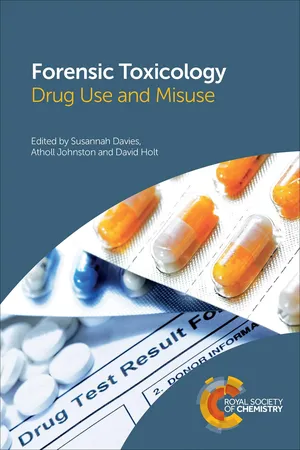
- 569 pages
- English
- ePUB (mobile friendly)
- Available on iOS & Android
About this book
New designer drugs, access to databases, and changing availability of samples for analysis have changed the face of modern forensic toxicology in recent years. Forensic Toxicology: Drug Use and Misuse brings together the latest information direct from experts in each sub-field of the discipline providing a broad overview of current thinking and the most innovative approaches to case studies.
The text begins with an in-depth discussion of pharmacoepidemiology, including information on the value of nationwide databases in forensic toxicology. The use and abuse of drugs in driving, sport and the workplace are then discussed by industry experts who are conducting case work in their field. Not only are new drug groups discussed (NPS), but also their constantly changing impact on drug legislation. Synthetic cannabinoids, khat and mephodrone are discussed in detail. Following a section devoted to legislation and defence, readers will find comprehensive chapters covering sample choice reflecting the increasing use of hair and oral fluid, and also the less commonly used sweat and nail analysis. New and old case examples are compared and contrasted in the final part of the book, which will enable readers to understand how drugs impact on each other and how the interpretative outcome of a case are dependent on many aspects.
From use of pharmaceutical drugs in a clinical setting, through smart drugs to new psychoactive drugs, this book documents the wide range in which drugs today are abused. This book will be an essential resource for postgraduate students in forensic toxicology, and for researchers in forensic toxicology laboratories who need the latest data and knowledge.
Frequently asked questions
- Essential is ideal for learners and professionals who enjoy exploring a wide range of subjects. Access the Essential Library with 800,000+ trusted titles and best-sellers across business, personal growth, and the humanities. Includes unlimited reading time and Standard Read Aloud voice.
- Complete: Perfect for advanced learners and researchers needing full, unrestricted access. Unlock 1.4M+ books across hundreds of subjects, including academic and specialized titles. The Complete Plan also includes advanced features like Premium Read Aloud and Research Assistant.
Please note we cannot support devices running on iOS 13 and Android 7 or earlier. Learn more about using the app.
Information
Email: [email protected]
1.1 Introduction
- Unnatural death investigations involving poisoning and overdosing with drugs.
- Driving under the influence of alcohol and/or other drugs.
- Drug facilitated crimes (incapacitation), such as date-rape.
- Control of illicit drugs in society, especially by people detained in prisons and other sectors of the criminal justice system.
- Child welfare and custody cases where suspicion arises that the parents or care-givers abuse drugs or administer drugs to the infants or elderly for which they are responsible.
- Monitoring the use of banned drugs by people enrolled in treatment and rehabilitation programs for substance abuse disorder.
- Drug testing in the workplace.
- Use of doping agents in sports.
1.2 Forensic Toxicology in Sweden
| Type of investigation | Year 2012 | Year 2013 | Year 2014 |
| Post-mortem toxicology | 5051 | 5084 | 5310 |
| Traffic cases (drun... |
Table of contents
- Cover
- Title Page
- Copyright Page
- Preface
- Contents
- 1 Introduction to Forensic Toxicology and the Value of a Nationwide Database
- 2 Forensic Pharmacology
- 3 The Role of Amnesty Bins in Understanding the Pattern of Recreational Drugs and Novel Psychoactive Substances Being Used Within a Locality
- 4 Contamination of Water with Drugs and Metabolites
- 5 Understanding the Utility of Analysis of Anonymous Pooled Urine from Standalone Urinals in Detecting and Monitoring Recreational Drug Use
- 6 Mephedrone and New Psychoactive Substances
- 7 Novel Psychoactives in New Zealand
- 8 Cannabis and Synthetic Cannabinoids
- 9 Khat – Chewing it Over: Continuing “Cultural Cement”, Cardiac Challenge or Catalyst for Change?
- 10 Role of Analytical Screening in the Management and Assessment of Acute Recreational Drug Toxicity
- 11 Workplace Drug Testing
- 12 Current Issues in Human Sport Drug Testing: Clenbuterol, Erythropoietin and Xenon
- 13 Drugs and Driving
- 14 Alcohol Technical Defences in Road Traffic Casework
- 15 New Psychoactive Substances and the Criminal Law
- 16 Scheduling of Drugs in the United States
- 17 Drug Legislation in New Zealand
- 18 Use of Reference Materials in Toxicology
- 19 Nail Analysis in Forensic Toxicology
- 20 Hair Testing in Forensic Toxicology
- 21 Drugs in Oral Fluid
- 22 Sweat as an Alternative Biological Matrix
- 23 Smart Drugs
- 24 Substandard and Counterfeit Medicines
- 25 Detection of Drugs and Drug Metabolites from Fingerprints
- 26 Investigating Drug Metabolism of New Psychoactive Substances Using Human Liver Preparations and Animal Studies
- 27 Case Examples and Discussion
- Subject Index